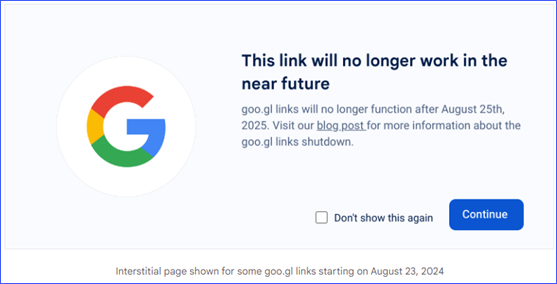
In a significant update announced recently, Google has decided to retire its URL Shortener service, also known as goo.gl. This change comes as part of Google’s efforts to streamline its product offerings and focus on more robust solutions that cater to evolving user needs.
About Google URL Shortener (goo.gl)
For those unfamiliar, Google’s URL Shortener was a handy tool that allowed users to shorten long URLs into more manageable links that were easier to share and remember. Whether you were sharing a blog post, sending a tweet, or tracking analytics, goo.gl provided a straightforward way to create compact URLs.
Why the Change?
The decision to retire goo.gl stems from Google’s strategic decision to concentrate resources on other projects that align more closely with current technological trends and user demands. Over the years, the URL shortening landscape has evolved with the emergence of numerous alternatives offering enhanced features and capabilities.
What Happens Next?
Effective August 23, 2024, Google URL Shortener links will begin displaying an interstitial page for a percentage of existing links, notifying users that these links will no longer be supported after August 25, 2025. It is crucial for users to prepare for this transition to alternative services.

Alternatives to Consider
- Bitly – Known for its analytics and branded short domains.
- TinyURL – Provides basic link shortening capabilities without requiring an account.
- Ow.ly – Integrated with Hootsuite, offering social media management features alongside URL shortening capabilities.
- Rebrandly – Focuses on branded links, allowing users to create custom short URLs that reflect their brand identity.
- T2M – Provides a user-friendly interface with detailed analytics and the ability to create custom short links.
Transitioning Your Links
For users currently relying on goo.gl links, Google has provided tools and recommendations to facilitate a smooth transition. You can export your existing links and choose alternative services that best fit your requirements. This transition period aims to minimize disruptions and ensure continued usability of your shortened URLs.
Looking Ahead
As Google shifts its focus towards more integrated solutions and innovative products, the retirement of goo.gl marks a milestone in the evolution of URL shortening technologies. While change can be unsettling, it also presents opportunities to explore new tools and strategies that enhance how we share and manage links in the digital age.
Conclusion
In conclusion, the retirement of Google URL Shortener (goo.gl) signals a strategic move by Google to realign its services with modern demands and technologies. While this change may require some adjustments for users accustomed to goo.gl, it also opens doors to explore alternative solutions that offer enhanced features and capabilities.
Stay tuned for further updates and explore the diverse range of URL shortening services available to find the right fit for your needs. Embracing change is part of staying agile in the ever-evolving digital landscape, and we’re here to help you navigate this transition smoothly.
Highly Rated Books on Google from Amazon
- Life After Google: The Fall of Big Data and the Rise of the Blockchain Economy by George Gilder
- How To Get To The Top of Google: The Plain English Guide to SEO by Tim Cameron-Kitchen
- Work Rules!: Insights from Inside Google That Will Transform How You Live and Lead by Laszlo Bock
 |
 |
 |
Support Techcratic
If you found this article helpful and would like to support Techcratic, consider making a Bitcoin donation. Your contributions help us continue to provide high-quality content and resources.
Bitcoin Address: bc1qlszw7elx2qahjwvaryh0tkgg8y68enw30gpvge
If you wish to donate through other means, please contact us at the Techcratic Contact form. Thank you.
Disclaimer: As an Amazon Associate, Techcratic may earn from qualifying purchases.














![Massive Apple deal event – M3 iPad Air all-time low, AirPods, M4 MacBooks $300 off, more [Updated]](https://techcratic.com/wp-content/uploads/2025/08/AirPods-Pro-2-AirPods-4-360x180.jpg)


























































![BASENOR 3PCS Tesla Model Y Model 3 Center Console Organizer [Carbon Fiber Edition]…](https://techcratic.com/wp-content/uploads/2025/08/71R5dfCR9FL._AC_SL1500_-360x180.jpg)















![Alien: Romulus – 4K + Blu-ray + Digital [4K UHD]](https://techcratic.com/wp-content/uploads/2025/08/81fBb0Z1egL._SL1500_-360x180.jpg)








